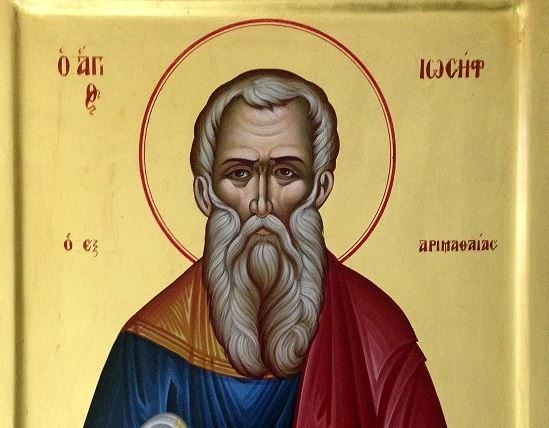Righteous Joseph of Arimathea (31 July)


Righteous Joseph of Arimathea was a secret disciple of our Lord Jesus Christ. As a member of the Sanhedrin he did not participate in the “counsel and deed” of the Jews in passing a death sentence for Jesus Christ. After the Crucifixion and Death of the Savior he made bold to go to Pilate and ask him for the Body of the Lord, to Which he gave burial with the help of Righteous Νikόdēmos, who was also a secret disciple of the Lord.
They took down the Body of the Savior from the Cross, wrapped it in a winding-cloth, and placed it in a new tomb, in which no one had ever been buried, in the Garden of Gethsemane, in the presence of the Mother of God and the holy Myrrh-Bearing Women (St Joseph had prepared this tomb for himself). Having rolled a heavy stone before the entrance of the tomb, they departed (John. 19: 37-42; Mt. 27: 57-61; Mark 15: 43-47; Luke. 24: 50-56).
Saint Joseph traveled around the world, proclaiming the Gospel of Christ. He died peacefully in England.
![]()
![]()
Saint Joseph of Arimathea was a prominent Jewish leader during the time of Jesus Christ. He is mentioned in the Gospels as being a rich man from Armiathea who was a secret disciple of Christ due to his status in the Sanhedrin. After the crucifixion and death of our Lord, Joseph approached Pontius Pilate out of piety and asked for the body of Jesus so that he might bury it honorably.


He, together with Saint Nicodemus, removed the body of Christ from the cross in the presence of the Theotokos and the Myrrh-Bearing Women, wrapped it in a linen shroud, anointed it with spices, and laid it in a new tomb that he owned. This disciple later traveled the world proclaiming the Gospel until he reposed in peace in England. The Church commemorates him individually on July 31st and along with the Myrrh-Bearing Women and Nicodemus on the 3rd Sunday of Pascha (the Sunday of the Holy Myrrh-Bearers).
Source: oca.org / goarch.org





